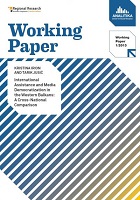International Assistance and Media Democratization in the Western Balkans: A Cross-National Comparison
International Assistance and Media Democratization in the Western Balkans: A Cross-National Comparison
Author(s): Tarik Jusić, Kristina Irion
Contributor(s): Mirela Rožajac-Zulčić (Editor)
Subject(s): Politics, Media studies, Regional Geography, Communication studies, Government/Political systems, Corruption - Transparency - Anti-Corruption
Published by: Analitika – Centar za društvena istraživanja
Keywords: Western Balkans; media; democratization; international assistance; cross-national comparison;
Summary/Abstract: This is the concluding report of a project aiming to enhance the knowledge and understanding of conditions and factors that influence the creation of sustainable and functional media institutions in the democratizing countries of the Western Balkans, especially in contexts where there is a strong presence of international assistance programs and conditionality mechanisms. The project covers four countries that emerged from former federal Yugoslavia, i.e. Bosnia and Herzegovina, Kosovo, Macedonia and Serbia, as well as a fifth country, Albania. This report summarizes and compares the country and subject-matter-specific contributions with the aim of exploring the nexus between the democratic transformation of the media and international media assistance as constrained by the local political conditions. Although the countries of the Western Balkans share significant social, political, historical and economic traits, the region’s recent trajectory has not been very coherent. Since the collapse of socialism in the 1990s, all five countries are undergoing a difficult transition to democracy and a free market economy. They have in common a post-authoritarian legacy, relatively small territories and weak economies. However, these similarities should not obstruct the recognition of important differences in political traditions, local cultures and ethnic composition of the population throughout the region. In the past, political traditions of statehood differed significantly, characterised by periods of bloom and decline as well as external influences, notably from the Ottomans and the Austrian empire. The region’s conflict-ridden history has inspired the term Balkanization, which is widely used to describe a process of geopolitical fragmentation. After the disintegration of Yugoslavia and war with the Serbian hegemon, Bosnia and Herzegovina and Kosovo were founded as modern states. Macedonia was also affected by a limited conflict between its two majority peoples – Macedonians and Albanians. NATO undertook extensive military interventions against Serb forces in Bosnia and Herzegovina in 1995, and in Kosovo and Serbia in 1999. Albania alone went through a peaceful transition albeit the country took in many war refugees, mainly from Kosovo. All of the countries in the focus of this project are multi-ethnic but their composition varies to a significant degree. In Albania and Kosovo, Albanians are by far the majority people but there is a significant Serb minority in the latter. Serbia’s dominant majority are Serbs (83 percent of the population). In contrast, Bosnia and Herzegovina is the home of three constituent peoples (Bosniaks, Serbs and Croats) and in Macedonia ethnic Macedonians and Albanians coexist, among others. Today, out of these five Western Balkan countries two are in the antechamber of the European Union (EU). For some time already Macedonia and, recently, Serbia have had candidate status but the pre-accession negotiations are open-ended. Bosnia and Herzegovina, Kosovo and Albania are still potential candidate countries, and thus further away from their ultimate aim to accede to the EU. Striving for EU membership requires from these Western Balkan countries to comply with its democratic and market economy standards (the so-called ‘Copenhagen Criteria’). Today EU conditionality is a major driver of reforms in the region.
Series: Analitika - Working Paper
- Page Count: 47
- Publication Year: 2013
- Language: English
- Content File-PDF
- Introduction

